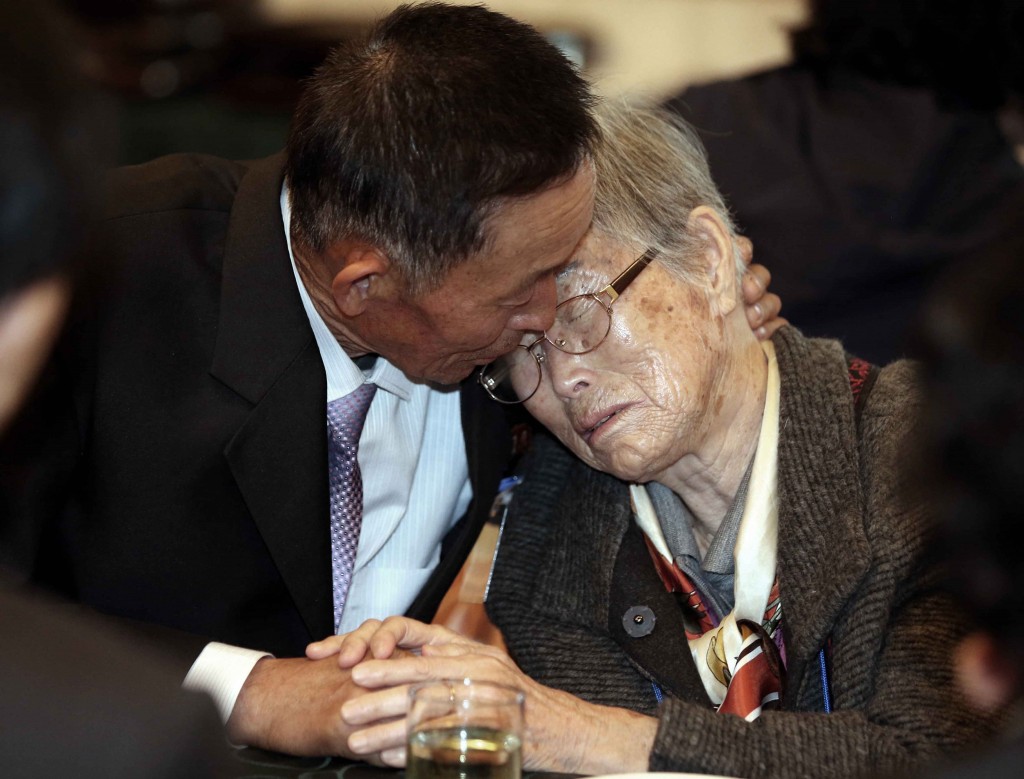- California Assembly OKs highest minimum wage in nation
- S. Korea unveils first graphic cigarette warnings
- US joins with South Korea, Japan in bid to deter North Korea
- LPGA golfer Chun In-gee finally back in action
- S. Korea won’t be top seed in final World Cup qualification round
- US men’s soccer misses 2nd straight Olympics
- US back on track in qualifying with 4-0 win over Guatemala
- High-intensity workout injuries spawn cottage industry
- CDC expands range of Zika mosquitoes into parts of Northeast
- Who knew? ‘The Walking Dead’ is helping families connect
Many S. Koreans reluctant to see N. Korean relatives

North Korean Han Son-il, left, hugs with his South Korean mother Lee Kum-seok to bid farewell after the Separated Family Reunion Meeting at Diamond Mountain resort in North Korea, Monday, Oct. 26, 2015. Parents and children, brothers and sisters and other relatives separated by the Korean war wept and hugged each other as they parted after their brief reunions, most for the first time in more than six decades. (Kim Do-hoon/Yonhap)
By Yi Whan-woo
About half of elderly South Koreans who may have relatives living in North Korea do not want to see them again for various reasons, according to data from the Ministry of Unification.
Speaking at a forum in Seoul, Tuesday, Unification Minister Hong Yong-pyo said only 30,000 of some 66,000 war-divided South Koreans wanted to find out whether their relatives in the North are still alive.
The government recently conducted a survey of war-divided families in line with an inter-Korean agreement to hold more reunion events following the latest one held last month.
Hong said that many, contacted by the government, said they do not want to find their relatives in the North.
The search is a prerequisite step to help reunite the war-divided families separated by the Demilitarized Zone amid concerns over their deteriorating health conditions. The 66,000 South Koreans are mostly in their 70s or older.
It is believed that the 33,000 war-separated South Koreans are concerned that the North’s repressive regime may put their loved ones under surveillance if such inter-Korean family relations are revealed.
“We’ve been told that Pyongyang has kept an eye on those who joined the inter-Korean family gatherings,” a unification ministry official said on condition of anonymity.
A similar view was echoed by Kang Myung-do, a former North Korean defector who was also son-in-law of a former North Korean prime minister.
“Pyongyang lacks a filing system to verify the fate of the war-divided family members in the North and some of them are even registered as deceased,” he said.
“In that regard, it can be embarrassing for the North when the South requests a search for those people. I’ve been told the Pyongyang authorities picked on those attending the inter-Korean family reunions and harassed them for no reason.”
A total of 20 rounds of inter-Korean family reunions have taken place since June 2000 under the approval of both Koreas. The most recent one was held from Oct. 20 to 26 where over 900 long-lost family members from both Koreas met at a resort on Mount Geumgang, North Korea.
The 33,000 people include those who were separated from spouses and children by the Korean War. Most of them have re-married and started families in the South.
Many are worried that their North Korean relatives will be disappointed about them re-marrying if they reunited, the unification ministry official said.
“It also can be burdensome for them to get approval from the respective spouses and children here,” the official added.
“In particular, those war-divided South Koreans rely on their children financially and it will be difficult to ignore their opinions when it comes to issues over meeting North Korean family members.”
A 45-year-old woman, who accompanied her 80-year-old mother to the October round of family reunions said that such meetings should be held regularly.
Those who have participated in the past 20 reunions have never had a second chance to reunite.
“Such circumstances only give pain for war-divided family members like us,” she said on condition of anonymity.
“And that’s probably why those 33,000 people do not want to see their loved one in the North.”

















Pingback: Over 30,000 South Koreans reluctant to see North Korean relatives since being separated in 1950 from Korean War | On Reddit